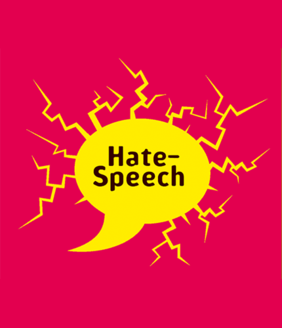forsa study: More hate on the net in the Corona year
"Three things become clear when looking at the new forsa figures on hate speech: the perception of hate on the net has increased in this past Corona year. Fear and anger are on the rise. And at the same time, more offenses are being reported. This shows that people don't want to put up with hate and incitement, and are instead fighting back and taking legal action. As the Media Authority of North Rhine-Westphalia, we are supporting this, especially through initiatives such as 'Follow instead of just delete'. Protecting democracy is a task for all of us - especially on the Internet," says Dr. Tobias Schmid, Director of the NRW State Media Authority, commenting on the evaluation of the forsa survey.
Since 2016, the State Media Authority NRW has conducted an annual survey on the topic of hate speech and hate comments on the Internet. In the current 2021 survey, around three quarters of respondents (76%) said they had already encountered hate speech or hate comments on the Internet. Compared with the previous year, the proportion of those who had very often or often encountered hate comments rose from 34% to 39% - a new record. The proportion of those who have not encountered any hate online is 22 percent. This value corresponds to that from the survey in 2018.
Hate on the net evokes strong emotions
The proportion of those who are frightened by hate comments on the net has risen particularly sharply (2020: 34%; 2021: 42%). Fear in relation to hate comments is reported particularly frequently by women (women: 51%; men: 33%). An increasing proportion of the population say that hate comments make them angry (2016: 72%; 2021: 77%). Here, too, there are major gender differences: Hate comments trigger anger significantly more often among women than among men (men: 70%; women: 84%). Understanding for the authors of hate comments has been decreasing continuously for three years (2019: 19%; 2021: 13%).
Resistance to hate and incitement to hatred is on the rise
This year, 25- to 44-year-olds have been particularly active in combating hate online. Based on those who have seen hate comments online, this age group was significantly more likely to say they had engaged with hate comments online in 2021 compared to previous years (2020: 42%; 2021: 53%). They also state significantly more frequently that they have reported a hate comment or its author to the relevant portal (2020: 30%; 2021: 42%). The group of 25 to 44 year-olds also seeks direct exchange with spreaders of hate and incitement more strongly. In 2021, one-third of 25- to 44-year-olds said they had responded to a hate comment to criticize it, an increase of 7 percentage points from the previous year (26%).
Overall, reports of hate comments are on the rise. More than half of respondents who have seen hate speech online said they have dealt with hate comments with a view to possibly reporting them. The proportion has risen sharply compared to the previous year (2020: 44%; 2021: 51%). This trend is particularly widespread among those under 25 (2021: 61%).
Effective strategies against hate on the net
For the first time, the study also asked the public's opinion on effective strategies against hate comments on the net. The prosecution of authors of hate speech was perceived as particularly effective (78%). This is followed by deleting hate comments quickly (73%). This is also where the project "Prosecute instead of just delete" comes in. As part of the initiative, public prosecutors, media companies and media regulators in NRW work together to prosecute hate comments that are relevant under criminal law. These can be reported in a simplified manner as part of "Verfolgen statt nur Löschen" ("Prosecute instead of just delete"). For around two-thirds of respondents, reportinghate comments to platform operators and independent hotlines is equally effective against hate comments on the net. Strategies that can be initiated by the users themselves are perceived as least effective; for example, active counter-speech is seen as an effective means by only 26% of the population.
Further information
- Report and presentation ofresults
- klicksafe topic area Hate Speech
- klicksafe overview: Initiatives and hotlines against Hate Speech
- Initiative "Follow up instead of just deleting" of the State Media Authority NRW
- Initiative "Track and Delete" of the Media Authority Rhineland-Palatinate

